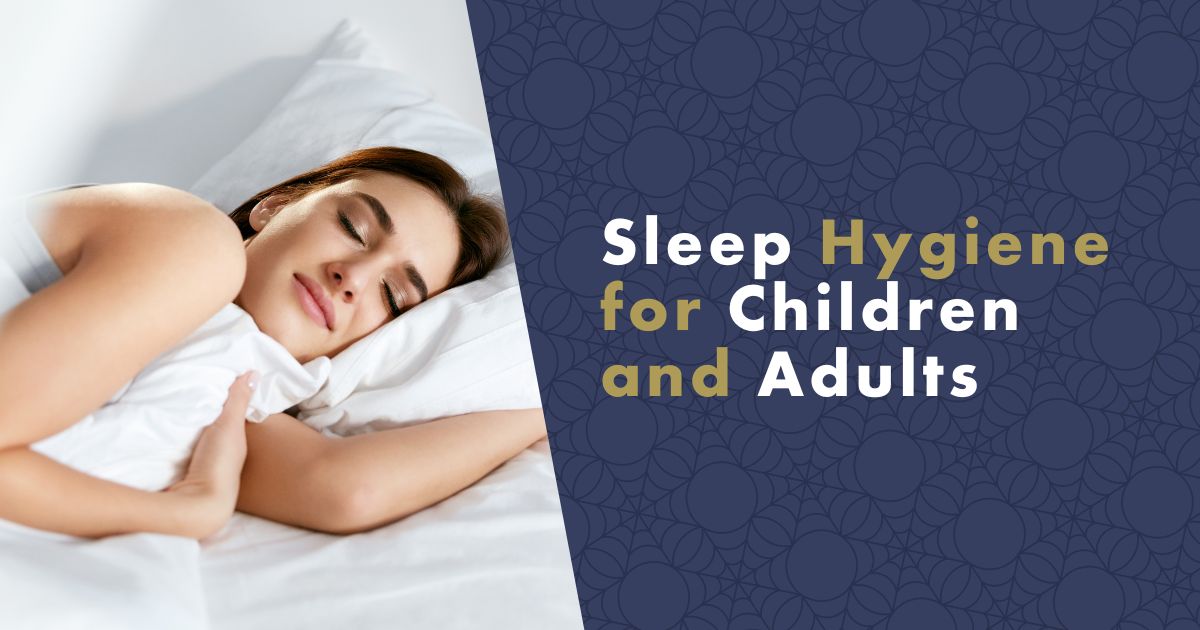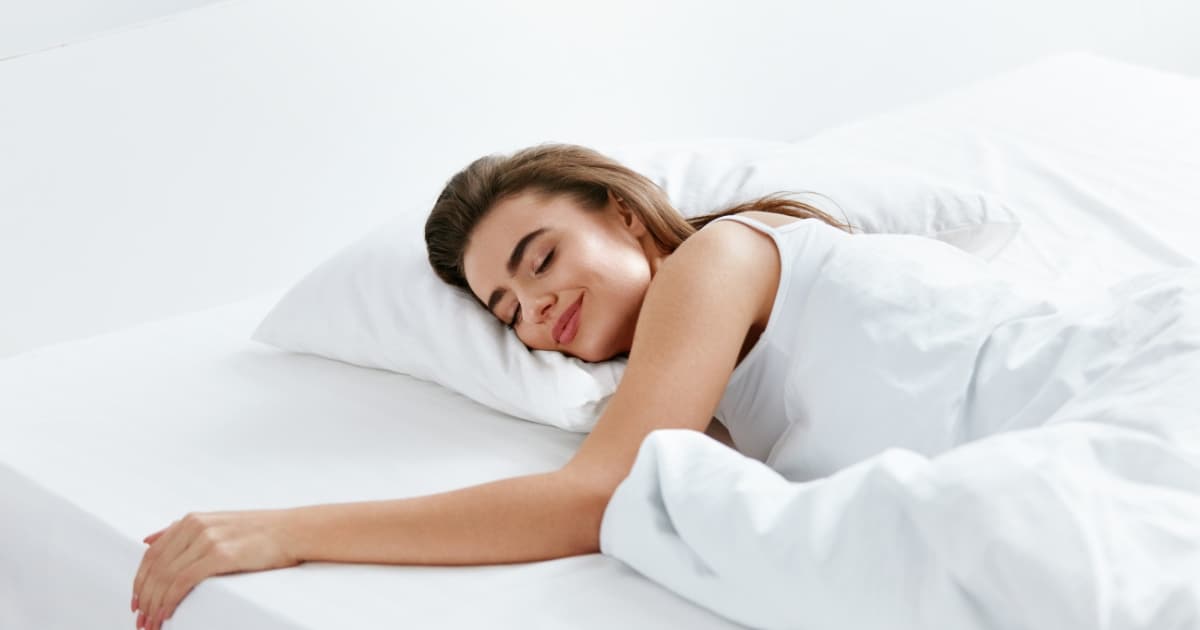If you're not getting enough quality sleep, you're likely to experience low energy levels, poor concentration, and, if it persists, it can also affect your physical health. Quality sleep is still the best recipe for a long life, as during sleep, our cells repair, muscles regenerate, and memory consolidation occurs. Sleep is essential for a quality life, as without it, our memory would not function, and we would not learn anything. If you're having trouble sleeping, it's time to start focusing on sleep hygiene. What are some ways to improve the quality of your sleep?

Physiology of Sleep: What Is Sleep and What Is It for?
Sleep is an essential requirement for all advanced living organisms, as it involves a relaxation process that leads to altered brain activity, loss of consciousness, and reduced sensitivity to external stimuli. The primary function of sleep is to regenerate physical and mental strength.
Sleep alternates with wakefulness in a circadian rhythm. This is a biological rhythm with a period of between 20 and 28 hours, but most often 24 hours long. Sleep shows the depression of the central nervous system.
During sleep, cyclical phenomena take place, which we refer to as:
- Non-REM sleep: is synchronous, and in adults, it predominates in a ratio of 4:1. Its function is to regenerate somatic functions.
- REM sleep: is paradoxical and serves to restore brain functions. It occurs approximately after 90 minutes of non-REM sleep and is characterized by dream activity and rapid eye movement (REM). This phase typically lasts from 5 to 20 minutes, and spontaneous awakening can occur during REM sleep.
#produkty#https://www.nanospace.store/search/?string=asleep
What Are the Causes of Insomnia
As individuals age, the quality of their night sleep often decreases. Nighttime awakenings become more frequent, the deepest stages of non-REM sleep decrease, and external noises may easily disrupt their sleep.
However, insomnia is not exclusive to older individuals, as younger individuals may also experience poor quality, unrefreshing sleep accompanied by difficulty falling asleep, shallow sleep, night waking, and early morning awakening. This results in chronic fatigue and reduced work performance, as well as negative impacts on psychological well-being.
In many cases, insomnia is caused by accumulated stress and unresolved problems. Other contributing factors include underlying medical conditions such as osteoarthritis, depression, COPD, nocturia, restless legs syndrome, Parkinson's disease, and poor sleep hygiene. The latter may include insufficient physical activity, consumption of alcohol and caffeinated drinks, unsuitable sleeping conditions, and late meals.
What Are the Consequences of Sleep Deficit
Adequate sleep is crucial for overall health and well-being, and the recommended amount of sleep varies based on age. Newborns require up to 17 hours of sleep, toddlers need about 14 hours, while school-aged children typically require 10 to 13 hours of sleep. Adults should aim for 7 to 9 hours of sleep per night, while seniors need 7 to 8 hours. However, the required sleep time varies from person to person, and some individuals function well with only five hours of sleep.
When individuals experience sleep deprivation, it can have a significant impact on their physical and mental health. They may become more irritable and experience decreased mental stability, poor work performance due to fatigue, and difficulty with memory and concentration.
Sleep deficit can also negatively affect the cardiovascular system and increase the risk of developing diabetes and obesity. Additionally, insomnia can cause premature aging and reduced libido. Therefore, it is crucial to address insomnia in order to maintain overall health and well-being.

Sleep Is a Crucial Investment in Your Overall Health and Well-being.
If you are experiencing issues with the quality of your sleep, it may be worth considering whether you are taking all the necessary steps to ensure a restful night. A high-quality mattress is the foundation of good sleep, but if you find yourself waking up feeling tired or swollen, it could be a sign of an allergy or sensitivity to dust mites. In such cases, investing in quality bedding may be beneficial.
Quality Mattress
While soldiers may be trained to fall asleep even with the sound of a plane taking off, most people require a comfortable bed and a quiet environment to fall asleep. A quality mattress that alleviates stress on the spine and joints is a fundamental requirement for a good night's sleep. Simply investing in a new mattress can improve the quality of sleep and alleviate insomnia.
Quality Pillow and Blanket
Consider using an orthopedic health pillow if you experience headaches or back pain during sleep. Additionally, maintaining a cooler room temperature is crucial for optimal sleep. If you tend to feel cold, consider using a warmer blanket.
Nanofabric sheets and bed linen are particularly beneficial for individuals with allergies or atopic conditions, as the tightly woven fabric prevents mites from passing through. However, anyone who values quality sleep can benefit from these bedding options. See what you find after two years in a regular pillow.
#produkty#https://www.nanospace.store/anti-dust-mite-bedding/
What Is Sleep Hygiene
Sleep hygiene comprises a set of sleep-related practices aimed at enhancing the quality of your sleep and reducing the duration it takes to doze off.
Decade of Sleep Hygiene
Sleep hygiene is suitable for everyone, including children, adults and seniors. If you follow the following ten, you will feel the results very quickly.
1) Do Not Eat Fatty and Heavy Meals before Going to Bed
To prevent insomnia, it is recommended that individuals avoid consuming heavy and fatty meals in the evening. It is best to have your final meal at least 3-4 hours prior to bedtime.
2) Avoid Screens
It is recommended to avoid all electronic devices, except for a book reader, at least 2-3 hours before going to bed. Screens emit blue light, which can reduce the level of the sleep hormone in the body, leading to difficulties in falling asleep.
3) Air Out Your Bedroom
Your bedroom should be ventilated, quiet, dark and at a temperature of 18 to 20°C before going to bed.
4) Always Go to Bed at the Same Time
It is recommended to maintain a consistent bedtime with a variation of no more than 15 minutes. Similarly, it is important to wake up at the same time every day, including weekends and holidays, to establish a regular sleep routine and prevent insomnia.
5) Drink Only Herbal Teas
Lemon balm or chamomile tea can induce relaxation due to their calming effects. Dietary supplements enriched with magnesium, group B vitamins, ginseng, guarana, piperine or ginkgo biloba can also help improve sleep and alleviate symptoms of stress.
6) Don't Sleep during the Day
If you experience sleepless nights, it's best to save your sleep for the following night. Avoid napping during the day, unless you are a small child who requires daytime sleep. To aid in falling asleep, consider using blackout curtains to eliminate any sources of light, especially if there is streetlight shining into your room. Melatonin, which is responsible for regulating sleep, is secreted in the dark, so keeping the room dark can contribute to a good night's sleep.
7) Don't Work or Study Late at Night
Working in the evening can be a major obstacle to falling asleep. It's no secret that when you work late at night, your mind continues to dwell on work-related thoughts. To ensure a good night's sleep, try to wrap up work-related tasks by 6 PM at the latest if you plan to go to bed at 10 PM.
8) Relax before Bed
Before going to bed, do only relaxing activities, read, listen to music and, above all, avoid thinking about work. Taking care of your body also helps to calm your mind. Therefore, in the evening before going to bed, you can revive your skin with a suitably selected face mask – peel-off, gel or nanofibre mask, which nourishes and hydrates the skin on your face. During their application, you can read a book, magazine or listen to music, thereby inducing pleasant feelings that will then help you fall asleep faster.
9) Limit Drinking Alcohol in the Evening
Despite the perception that alcohol may help you sleep better, it actually disrupts the quality of your sleep. Consuming alcohol can increase the frequency of waking up, reduce the overall sleep quality, and potentially lead to sleep disorders.
10) Limit Caffeine 12 Hours before Bed
The duration for caffeine breakdown may vary between 8 to 10 hours, but recent research suggests it can take up to 12 hours to fully metabolize caffeine after consuming coffee, green or black tea, or other caffeinated drinks. If you experience difficulty falling asleep, it's advisable to be mindful of the timing of your last caffeine intake.
Sources:
-
Bliwise, D. L. (1993). Sleep in normal aging and dementia. Sleep, 16(1), 40-81.
-
National Sleep Foundation. (2013). Sleep in America® Poll: Sleep and Aging.
-
Ohayon, M. M. (2002). Epidemiology of insomnia: what we know and what we still need to learn. Sleep medicine reviews, 6(2), 97-111.
-
Buysse, D. J., Reynolds III, C. F., Monk, T. H., Berman, S. R., & Kupfer, D. J. (1989). The Pittsburgh sleep quality index: A new instrument for psychiatric practice and research. Psychiatry Research, 28(2), 193-213.
-
Krueger, J. M., & Obál Jr, F. (1993). Sleep function. Frontiers in bioscience: a journal and virtual library, 1, d233-d243.
-
Wong, M. L., Lau, E. Y., Wan, J. H., & Cheung, S. F. (2013). The interplay between sleep and mood in predicting academic functioning, physical health and psychological health: A longitudinal study. Journal of psychosomatic research, 74(4), 271-277.
-
Buysse, D. J., Reynolds III, C. F., Monk, T. H., Berman, S. R., & Kupfer, D. J. (1989). The Pittsburgh sleep quality index: A new instrument for psychiatric practice and research. Psychiatry Research, 28(2), 193-213.
-
Maraldi, C., Volpato, S., Penninx, B. W., Yaffe, K., Simonsick, E. M., Strotmeyer, E. S., ... & Ferrucci, L. (2015). Impact of inflammation on the relationship among sleep duration, cognitive impairment, and dementia: A multicenter cohort study. Journal of the American Geriatrics Society, 63(2), 227-234.
-
Cajochen, C., & Chellappa, S. L. (2016). The effects of sleep hygiene education on sleep hygiene behaviors in children with neurodevelopmental disabilities. Journal of clinical sleep medicine: JCSM: official publication of the American Academy of Sleep Medicine, 12(3), 447-449.
-
Afonso, P., Figueiredo-Braga, M., Tavares, J., & Paiva, T. (2018). Sleep hygiene and actigraphic evaluation of insomnia in a sample of Portuguese college students. Sleep and Breathing, 22(3), 643-650.
- Walker, M. (2017). Why we sleep: Unlocking the power of sleep and dreams. Simon & Schuster.
- LEGER, Damien, et al. Poor sleep is highly associated with house dust mite allergic rhinitis in adults and children. Allergy, Asthma & Clinical Immunology, 2017, 13: 1-9.
-
Dement, W. C., & Vaughan, C. (1999). The promise of sleep: A pioneer in sleep medicine explores the vital connection between health, happiness, and a good night’s sleep. Delacorte Press.
-
Carskadon, M. A., & Dement, W. C. (2011). Normal human sleep: An overview. In Principles and practice of sleep medicine (5th ed., pp. 16-26). Elsevier Saunders.
-
Horne, J. (2013). Why we sleep: The functions of sleep in humans and other mammals. Oxford University Press.
-
Siegel, J. M. (2004). The essential neuroscience of sleep. MIT Press.

